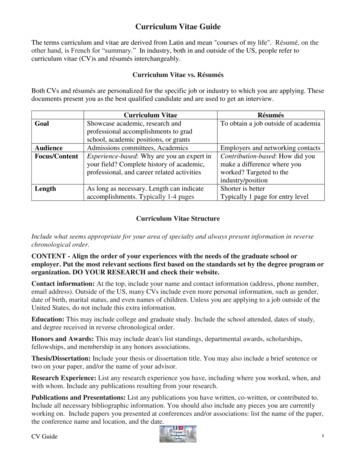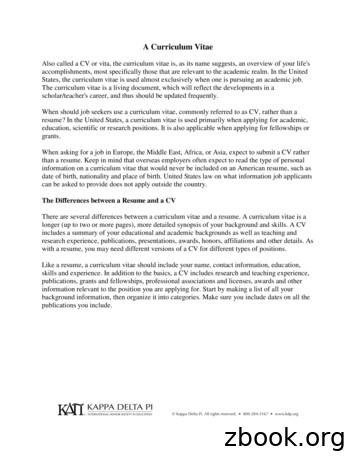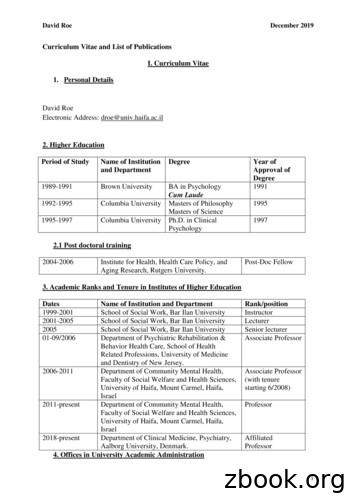CURRICULUM VITAE (updated June 2020)
CURRICULUM VITAE(updated June 2020)Edward Gilman Slingerland III 森舸瀾Distinguished University ScholarProfessor, Department of Asian StudiesAssociate Member, Departments of Philosophy and PsychologyDirector, Database of Religious History (DRH; http://religiondatabase.org/)Co-Director, Centre for Human Evolution, Cognition and Culture (HECC)Director, Cultural Evolution of Religion Research Consortium (CERC) (2012-2018)Andrew W. Mellon Foundation Fellow, Center for Advanced Study in the Behavioral Sciences, StanfordUniversity (2015-16)Early Career Scholar (Senior), Peter Wall Institute for Advanced Studies (2008-2009)Canada Research Chair (Tier II) in Chinese Thought and Embodied Cognition (2005-2015)University of British ColumbiaAsian Centre, 403-1871 West MallVancouver, B.C. Canada V6T 1Z2e-mail: edward.slingerland@ubc.cat: (604) 827-3160 f: (604) 822-8937Homepage: 9/94–08/98Ph.D., Religious Studies, Stanford University (1998)Area of Specialization: Early Chinese thoughtFields: Virtue ethics, hermeneutics09/91–06/94M.A., East Asian Languages (classical Chinese), UC Berkeley09/88–06/91B.A., with Distinction, Stanford University, Asian Languages (Chinese)Phi Beta Kappa12/88–12/89Chinese Language Center, Tunghai University, Taichung, Taiwan, ROC09/86–06/88Princeton University, biology and Chinese languageAdditional summer language training sessions at Goethe-Institut (Goettingen, Berlin) and AllianceFrançaise (Paris)RESEARCH INTERESTSWarring States (5th-3rd c. B.C.E.) Chinese thought, religious studies (comparative religion,cognitive science and evolution of religion), cognitive linguistics (blending and conceptual metaphortheory), ethics (virtue ethics, moral psychology), cognitive science, evolutionary psychology, therelationship between the humanities and the natural sciences, and the classical Chinese language.BOOK MANUSCRIPT IN PROGRESSDrunk: How We Sipped, Danced and Stumbled to Civilization (Little, Brown Spark, in preparation,forthcoming June 2021).1
BOOKS AND EDITED VOLUMES (asterisks indicate refereed publication; sole-authored unlessotherwise indicated)Huang, Kevin and Edward Slingerland (editors), Guoji Hanxue luncong 國際漢學論叢 Special Issue onChinese Philosophy and Cognitive Science, Jao Tsung-I Academy of Sinology in Hong Kong, inpreparation.* Mind and Body in Early China: Beyond Orientalism and the Myth of Holism. New York: OxfordUniversity Press, January 2019 (385 xi pages).Korean Edition (trans. Donghwan Kim), forthcoming March 2020.Reviewed: “Is Chinese Culture Dualist? An Answer to Edward Slingerland from a Medical PhilosophicalViewpoint” (article discussion of Slingerland 2013 version), Journal of the American Academy ofReligion 85.4 (December 2017), 1017-1031 (Pan Dawei)Dao: A Journal of Comparative Philosophy 18.2 (June 2019), 305-312, with author reply and reviewerresponse, (J. Behuniak)Journal of the American Academy of Religion () (O. Tavor)Journal of World Religions 4 (Winter 2019): 166-172 (J. Sellman)* Tappenden, Frederick, and Edward Slingerland (eds.), Religion, Digital Humanities, and CognitiveHistoriography, a special issue of the Journal of Cognitive Historiography 3:1-2 (2018).Trying Not to Try: Ancient China, Modern Science and the Power of Spontaneity. New York: Crown (RandomHouse), March 2014 (295 vi pages), paperback March 2015.Audiobook from Random House Audio (narrated by Marc Cashman)UK Edition: Trying Not to Try: The Ancient Art of Effortless and Surprising Power of Spontaneity, Canongate, April 2014,paperback forthcoming January 2015German Edition: Wie wir mehr erreichen, wenn wir weniger wollen: Das Wu-Wei-Prinzip, Berlin Verlag (translated byBernhard Kleinschmidt), April 2014Dutch Edition: Proberen niet te proberen: Waarom alles beter gaat als je het niet te graag wilt, Maven (translated by Inekevan den Elskamp), April 2014Russian Edition: И не пытайтесь! Древняя мудрость, современная наука и искусство спонтанности,Corpus (translated by Maria Solnceva), October 2017.Chinese Edition: 为: 古代中国、现代科学及 发性的 量, Modern Press (translated by G.Q. Shi), January,2018, with new Author’s PrefaceKorean Edition: 무위(無爲)로의 노력: 고대 중국, 현대 과학, 자발성의 힘, Goban Publishing (translatedby Donghwan Kim), September 2018, with new Author’s PrefaceExcerpts published in Utne Reader (February 2014), Nautilus 10 (February 5, 2014) Adbusters 113 (May 20, 2014),and NRC Handelsblad (Netherlands) (September 27, 2014)Winner, “Outstanding Book for General Readers,” Korea Ministry of Culture, Sports and Tourism (Nov 2019)Nominated, “Academic Excellent Books,” Korean National Academy of Science (December 2019)Best 14 Books on Philosophy/Psychology of 2014 (Brain Pickings)Best Books of 2014 (J. Baggini, The Guardian)Topic of Author Meets Critics Session, American Philosophical Association Annual Meeting, Pacific Division,Vancouver, BC, April 2015.Reviewed: Publishers Weekly (December 12, 2013)Kirkus Reviews LXXXIII.1 (February 1, 2014)Huffington Post “Just Do It” (February 24, 2014) (P. Clothier)Financial Times (UK) “Templates For Gaining Wisdom” (March 7, 2014) (J. Baggini)The Atlantic “How to Not Try” (March 21, 2014) (J. Hamblin)International Journal of Psychotherapy (Vol. 18 2014) (P. Kleefield)Huffington Post (April 15, 2014) (D. Vognar)Brain Pickings (April 21, 2014) (M. Popova)VPRO Gids (April 29, 2014) (Netherlands) “Spontaniteit als bron van beschaving” (B. Van Straten)The Psychologist (UK) (July 1, 2014) (R. McDonald)Der Standard (Germany) (June 18, 2014) “Wie sich Ziele leichter erreichen lassen” (H. Volk)2
New Statesman (UK) (July 16, 2014) “Think before you act: against the modern cult ofspontaneity” (S. Poole)Le Temps (Switzerland) (August 2, 2014) “«Wu wei», l’art de réussir sans essayer” (N. Ulmi)Intermediar (Netherlands) (September 1, 2014) “Doe niets en doe alles” (D. Koppes)8 Weekly (Netherlands) (September 2, 2014), “Weg Wijs als wegwijzer” (R. Evers)LA Review of Books, Marginalia (September 2, 2014) “The Paradox of Wu-wei” (A. Irvine)New York Times (December 16, 2014) (J. Tierney)Sydney Morning Herald (December 17, 2014) (R. Clun)NRC Handelsglad (Netherlands) (January 3, 2015) “De verbijsterende actualiteit van stokoude woewei-discussies” (H. Spiering)Journal of the Cognitive Science of Religion 2.2 (September 2015), 164-168 (J. Kiper)Notre Dame Philosophical Reviews (November 5, 2015) (B. Seok)Frontiers of Philosophy in China 10.4, 691-694 (F. Perkins)Het Financieele Dagblad (Netherlands) “Waarom loslaten daadwerkelijk helpt” (July 28, 2016) (M.B.Andreae)Huffington Post “Stepping Into a Strategic Leadership Role: Lessons from Ancient ChinesePhilosophy” (September 30, 2016) (D. Brendel)Philosophy East & West 68.1 (January 2018), 298-301 (P. D’Ambrosio)New York Magazine (The Cut) (July 3, 2018) “Mastering the Art of Caring Less” (J. Friedlander)* Slingerland, Edward and Mark Collard (edited), Creating Consilience: Integrating the Sciences and theHumanities, Oxford University Press, New Directions in Cognitive Science series, 2012 (472 xvpages)Reviewed:Modern Fiction Studies 58.2 (Summer 2012): 406-409 (L. Slimak)Metapsychology Online Reviews 16.37 (September 2012) (R. Hibbert)The Evolutionary Review 4.1 (Fall 2013) (M. Austin)Journal of Cognitive Historiography 2.1 (2015): 82-85 (M. Palecek)* Bulbulia, Joseph and Edward Slingerland (edited), Evolutionary Science and the Study of Religion, aspecial issue of the journal Religion 41.3 (September 2011).* What Science Offers the Humanities: Integrating Body & Culture. New York: Cambridge University Press,February 2008 (370 xvi pages)Topic of Author Meets Critics session, American Academy of Religion Annual Meeting, Montréal, QB (2009)Korean edition (with new Author’s Preface): 과학과 인문학: 몸과 문화의 통합, Chiho Publishing House(translated by Dong-hwan Kim and Yeong-ho Choi), January 2015.Excerpts published in Brian Boyd, Joseph Carroll and Jon Gottschall (eds.), Evolution, Literature & Film: A Reader,Columbia University Press (2010)Reviewed: Science 322 (10 October 2008): 195-196 (H. Fromm)“Quo vadis, humaniora?” (article discussion), Language and Literature (Keel ja Kirjandus) (August 09,2008), 577-588 (M. Tamm) [in Estonian]Isis 100 (March 2009): 211-212 (G.E.R. Lloyd)Metapsychology online reviews 13.31 (July 28, 2009) (R. Harrington)“Putnam, Dennett, and Others: Philosophical Resources for the World Historian” (articlediscussion), Journal of World History 20.4 (December 2009), 491-522 (J. Wills)“The Educator Must Be Educated: The Study of Religion at the End of the Humanities” (articlediscussion), Method & Theory in the Study of Religion 22.1 (2010), 1-8 (M. Day)Journal for the Study of Religion, Nature & Culture 222 4.3 (October 2010): 235-238 (N. Barrett)The Heythrop Journal 52.2 (March 2011): 351-352 (B. McCall)“The Humanities as Empirically Grounded Sciences,” Historical Methods 44.4 (Oct-Dec 2011): 165170 (M. Schouten)“Can the Two Cultures Reconcile? Reconstruction and Neuropragmatism” (article discussion),Handbook of Neurosociology (2013), 83-97 (T. Solymosi)Confucius: The Essential Analects (abridged version of the Analects, with traditional commentary, foruse in survey courses). New York: Hackett Publishing Company, March 2006 (164 xxvi pages)Reviewed:Religious Studies Review 33.1 (January 2007): 82-83 (R. Kirkland)3
* Confucius: Analects (full translation with running traditional commentary, glossary, and extensiveintroduction). Cambridge, MA: Hackett Publishing Company, 2003 (279 xxix �‘丰厚翻译’”[“A Thick Translation of the Analects by EdwardSlingerland”], 外语学刊 [Foreign Language Research], 2017 (5): 111-116. (Zhang Defu 张德福)[in Chinese]“《論語 �” [“Transplanting The Analects CommentaryTradition in the West from James Legge to Edward Slingerland”], nal of Sichuan University (Social Science Edition)], 2015 (3): 58-66 (Jin Xueqin金学勤) [in Chinese]“An Introduction to and Appraisal of Edward Slingerland’s Analects translation” (review article), 中國科技翻譯 [Chinese Science and Technology Translators Journal] 20.21 (February 2007), 59-62 (WangYong 王勇) [in Chinese]“Images of Traditional Chinese Culture in Contemporary Translations: A Comparison of ThreeRepresentative English Translations of the Analects” (review article), 社會縱橫 [Social SciencesReview] 21.8 (August 2006), 175-176 (Wei Wangdong 魏望東 and Huang Botian 黃伯天) [inChinese]Dao: A Journal of Comparative Philosophy 4.2 (Summer 2005): 389-394 (D. Fielding)Journal of Chinese Philosophy 32.2 (June 2005): 337-339 (T.K. Hon)“A Multiperspective Comparison of Three Translations of the Analects Across the Centuries: FromJames Legge to Ezra Pound to Edward Slingerland” (review article), 中國翻譯 [ChineseTranslators Journal] 26.3 (May 2005), 52-57 (Wei Wangdong 魏望東) [in Chinese]“Recent Works on Confucius and the Analects” (feature review) Philosophy East & West 55.1 (January2005): 99-109 (R. Littlejohn)China Review International 11.1 (Spring 2004): 174-180 (Y.K. Lo)Journal of Chinese Religions 31 (2003): 292-93 (P. Goldin)* Effortless Action: Wu-wei as Conceptual Metaphor and Spiritual Ideal in Early China. New York: OxfordUniversity Press, 2003 (352 xi pages) (paperback edition, May 2007)Winner, AAR Best First Book in the History of Religions awardTopic of paper session, Central Division American Philosophical Association Meeting, Chicago, IL (2004)Korean edition (with new author’s preface): 힘들이지 않는 행동: 무위와 영적 이상에 관한 초기 중국의 개념적 은유, LogosLime (trans. Kim Donghwan and Cho Hyunill), March 2020.Chinese edition (with new Author’s Preface): 《 � (trans. ShiGuoqiang), Oriental Publishing Group Corporation (Shanghai), April 2020.Chapter One translated as �的 ‘無為’”(trans. Yan Yixun and ShiGuoqiang), 瀋陽師範大學學報 43:3: 112-124 (2018)Reviewed: “Generalizations, Cultural Essentialism, and Metaphorical Gulfs” (article discussion), Dao: A Journalof Comparative Philosophy (September 2018), 479-497 (Joshua Mason)““Comparison by Metaphor: Archery in Confucius and Aristotle” (article discussion), Dao: A Journalof Comparative Philosophy 16.2 (March 2017), 165-185 (Rina Marie Camus)“Paradox of Wuwei? Yes and No” (review article) Asian Philosophy 23.2 (April 2013): 115-136 (N.Knightly)“Embodiment and Virtue in a Comparative Perspective” (review article) Journal of Religious Ethics 35.4(December 2007): 715-728 (J. Schofer)“Paradox of Wuwei?” (review article) Journal of Chinese Philosophy 34.2 (June 2007): 277-287 ��之詮釋” (‘A Critique of Slingerland’s Interpretation of Wu-wei inthe Laozi’) (review article), 中國哲學與文化 (The Journal of Chinese Philosophy and Culture) 1 (May2007): 321-326 (L.J. Yang)“On Wu-wei as a Unifying Metaphor” (feature review) Philosophy East & West 57.1 (January 2007):97-106 (C. Fraser)History of Religions 45.2 (November 2005): 181-182 (R. Campany)Harvard Journal of Asiatic Studies 64.2 (December 2004): 511-516 (K.L. Shun)Journal of Asian Studies 63.1 (February 2004): 172-173 (A. Fox)4
China Review International 10.2 (Fall 2003): 452-457 (E. Cline)Journal of Chinese Religions 31 (2003): 294-295 (J. Geaney)JOURNAL ARTICLES (asterisks indicate refereed publications; sole-authored unless otherwiseindicated)* Slingerland, Edward, M. Willis Monroe, Rachel Spicer, Michael Muthukrishna. “The Emperor HasNo Data: A reply to Whitehouse, H., François, P., Savage, P. E., Currie, T. E., Feeney, K. C., Cioni,E., Turchin, P., A new era in the study of global history is born but it needs to be nurtured,”Journal of Cognitive Historiography (in preparation).* Thornton, Mark, Brian Reilly, Edward Slingerland and Diana Tamir. “Text analysis revealsculturally universal dimensions of mental state representation” (preprint published April 2020,https://psyarxiv.com/m5p74).* Muthukrishna, Michael, Joseph Henrich and Edward Slingerland. “Psychology as a HistoricalScience,” Annual Review of Psychology (submitted).* Slingerland, Edward, Quentin D. Atkinson, Carol Ember, Oliver Sheehan, Michael Muthukrishna,Joseph Bulbulia, and Russell D. Gray, “Coding Culture: Challenges and Recommendations forComparative Cultural Databases,” Evolutionary Human Sciences (published online June 2021;DOI: https://doi.org/10.1017/ehs.2020.30).* Beheim, Bret, Quentin Atkinson, Joseph Bulbulia, Will Gervais, Russell Gray, Joseph Henrich,Martin Lang, M. Willis Monroe, Michael Muthukrishna, Ara Norenzayan, Benjamin Purzycki, AzimShariff, Edward Slingerland, Rachel Spicer, Aiyana Willard. “Treatment of missing data determinestiming of moralizing gods in world history,” Nature (revise and ion: Cognitive Science and Chinese Philosophy,” in Huang, Kevin and EdwardSlingerland (editors), Guoji Hanxue luncong 國際漢學論叢 Special Issue on Chinese Philosophy andCognitive Science, Jao Tsung-I Academy of Sinology in Hong Kong, in press.* Nichols, Ryan, Edward Slingerland, Kristoffer Neilbo, Peter Kirby and Carson Logan.“Supernatural agents and prosociality in historical China: micro-modeling the cultural evolution ofgods and morality in textual corpora,” Religion Brain and Behavior (forthcoming, published onlineMarch 2020, https://doi.org/10.1080/2153599X.2020.1742778).* Slingerland, Edward, M. Willis Monroe, Brenton Sullivan, Robyn Faith Walsh, DanielVeidlinger,William Noseworthy, Conn Herriott, Ben Raffield, Janine Larmon Peterson, GretelRodríguez, Karen Sonik, William Green, Frederick S. Tappenden, Amir Ashtari, Rachel Spicer,Michael Muthukrishna, “Historians Respond to Whitehouse et al. 2019, ‘Complex societies precedemoralizing gods throughout world history,’” Journal of Cognitive Historiography nse to Jim Behuniak,” Dao: A Journal of Comparative Philosophy 18.3: 485-488 (2019).* Tappenden, Frederick and Edward Slingerland. “Introduction: Religion, Digital Humanities, andCognitive Historiography,” Journal of Cognitive Historiography 3:1-2: 7-11 (2018).5
* Brenton Sullivan, Michael Muthukrishna, Frederick Tappenden and Edward Slingerland,“Exploring the Challenges and Potentialities of the Database of Religious History for CognitiveHistoriography,” Journal of Cognitive Historiography 3:1-2: 12-31 (2018).* Nielbo, Kristoffer, Ryan Nichols and Edward Slingerland. “Mining Past Minds: Data-IntensiveKnowledge Discovery in the Study of Historical Textual Traditions,” Journal of Cognitive Historiography3:1-2: 93-118 (2018).* Nichols, Ryan, Edward Slingerland, Kristoffer Nielbo, and Uffe Bergeton. “Modeling theContested Relationship Between Analects, Mencius, and Xunzi: Preliminary Evidence from aMachine-Learning Approach,” Journal of Asian Studies 77.1: 19-57 (2018).* Slingerland, Edward, Ryan Nichols, Kristoffer Nielbo and Carson Logan. “The Distant Readingof Religious Texts: A ‘Big Data’ Approach to Mind-Body Concepts in Early China” Journal of theAmerican Academy of Religion 85.4: 985–1016 (2017).“Metaphor, Blending, and Cultural Variation: A Reply to Camus,” Dao: A Journal of ComparativePhilosophy 16.3: 431-435 (2017).* Slingerland, Edward and Brenton Sullivan. “Durkheim With Data: The Database of ReligiousHistory (DRH),” Journal of the American Academy of Religion 85.2: 312-347 (2017).Norenzayan, Ara, Azim Shariff, Aiyana Willard, Will Gervais, Rita McNamara, Edward Slingerlandand Joseph Henrich. “Parochial Prosocial Religions: Historical and Contemporary Evidence for aCultural Evolutionary Process.” Behavioral and Brain Sciences Vol. 39 (published online March 2016;doi:10.1017/S0140525X14001356, e1; 22 pages).* Norenzayan, Ara, Azim Shariff, Aiyana Willard, Will Gervais, Rita McNamara, Edward Slingerlandand Joseph Henrich. “The Cultural Evolution of Prosocial Religions,” Behavioral and Brain SciencesVol. 39 (published online March 2016; doi:10.1017/S0140525X14001356, e1; 19 pages).Winner, Daniel M. Wegner Theoretical Innovation Prize, Society for Personality and Social Psychology, 2017* “Big Gods, Historical Explanation, and the Value of Integrating the History of Religion Into theBroader Academy,” Religion 45.4: 585-602 (2015).* “Crafting Bowls, Cultivating Sprouts: Unavoidable Tensions in Early Chinese Confucianism,”Dao: A Journal of Comparative Philosophy 14.2: 211-218 (2015).* Hruschka, Daniel, Charles Efferson, Ting Jiang, Ashlan Falletta-Cowden, Sveinn Sigurdsson, RitaMcNamara, Madeline Sands, Shirajum Munira, Edward Slingerland and Joseph Henrich. “ImpartialInstitutions, Pathogen Stress and the Expanding Social Network,” Human Nature 1-13 (2014).* “Toward a Second Wave of Consilience in the Cognitive Scientific Study of Religion,” Journal forCognitive Historiography 1.1: 121-130 (2013).* “Body and Mind in Early China: An Integrated Humanities-Science Approach,” Journal of theAmerican Academy of Religion 81.1: 6-55 (March 2013).JAAR #43 most-read article as of August 2016Portions reprinted in “China as the Radical “Other”: Lessons for the Cognitive Science of Religion,” in Is ReligionNatural? The Chinese Challenge, ed. Ryan Hornbeck, Elizabeth Seiver and Justin Barrett (2017)Modified version reprinted as “Interdisciplinary Methods in Chinese Philosophy: Comparative6
Philosophy and the Case Example of Mind- Body Holism,” in Research Handbook on Methodology in ChinesePhilosophy, ed. Sor Hoon Tan, pp. 323-351. London: Bloomsbury (2016).Turchin, Peter, Harvey Whitehouse, Pieter François, Edward Slingerland and Mark Collard. “AHistorical Database of Sociocultural Evolution.” Cliodynamics: The Journal of Theoretical andMathematical History 3: 271–293 (December 2012).* Bulbulia, Joseph and Edward Slingerland. “Religious Studies as a Life Science,” Numen 59.5: 564–613 (2012).“Back to the Future: A Response to Martin and Wiebe,” Journal of the American Academy of Religion80.3: 611-617 (2012).Reprinted in Conversations and Controversies in the Scientific Study of Religion, ed. Luther Martin and Donald Wiebe,Leiden: Brill (2016), pp. 302-307.JAAR #27 most-read article as of August, 2016* �學,
“The Educator Must Be Educated: The Study of Religion at the End of the Humanities” (article discussion), Method & Theory in the Study of Religion 22.1 (2010), 1-8 (M. Day) Journal for the Study of Religion, Nature & Culture 222 4.3 (October 2010): 235-238 (N. Barrett) Th
Curriculum Vitae Guide The terms curriculum and vitae are derived from Latin and mean "courses of my life". Résumé, on the other hand, is French for “summary.” In industry, both in and outside of the US, people refer to curriculum vitae (CV)s and résumés interchangeably. Curriculum Vitae vs. Résumés
CV curriculum vitae CV v. resume – Length – Scholarly/scientific. Curriculum Vitae CV curriculum vitae CV v. resume – Length – Scholarly/scientific – Detailed. Curriculum Vitae (CV) Name, title, curren
A Curriculum Vitae Also called a CV or vita, the curriculum vitae is, as its name suggests, an overview of your life's accomplishments, most specifically those that are relevant to the academic realm. In the United States, the curriculum vitae is used
Conc Diagram- All Failures Cispa Data Avalon Date PCB Lot Number Igarashi TPS date codes. MB Panel Number VIAS Hole Location Failure 9-June'09 11-June'09 923 162 12-June'09 923 163,164 TBD TBD 1 13-June'09 923 164 15-June'09 923 166 16-June'09 923 167 17-June'09 923 168,171 18-June'09 923 171 19-June'09 923 171 20-June'09 923 171 22-June'09 923 173 23-June '09 923 179 24-June '09 923 .
Animal Disease Traceability (ADT) Monitoring and Compliance March 7, 2014 Updated April 2015 Updated May 2016 Updated May 2017 Updated June 2018 Updated June 2019 Updated June 2020 Version 2.7 United States Department of Agriculture . FOR OFFICAL USE ONLY 2
3.0 TYPES OF CURRICULUM There are many types of curriculum design, but here we will discuss only the few. Types or patterns are being followed in educational institutions. 1. Subject Centred curriculum 2. Teacher centred curriculum 3. Learner centred curriculum 4. Activity/Experience curriculum 5. Integrated curriculum 6. Core curriculum 7.
Curriculum Vitae: Adrian KC Lee, ScD Updated: 11/11/2021 Page 1 of 16 Curriculum Vitae . 2011 - 2015 Assistant Professor of Speech & Hearing Sciences, Institute for Learning & Brain Sciences . Harvard Medical School & Massachusetts General Hospital, Boston, MA 2007 - 2009 Research Fellow, Department of Psychiatry .
1 Curriculum Vitae and List of Publications I. Curriculum Vitae 1. Personal Details David Roe Electronic Address: droe@univ.haifa.ac.il 2. Higher Education Year of Approval of Degree Name of Institution Degree and Department Period of Study BA in Psychology 1991 Cum Laude 1989-1991 Brown University Masters of Philosophy 1995 Masters of Science























